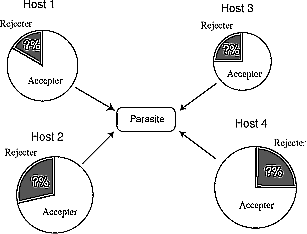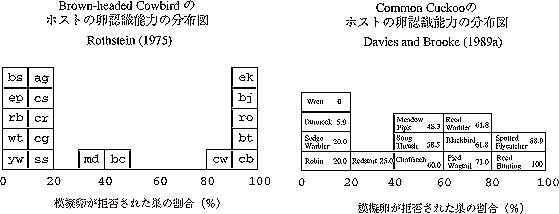Generalized Parasite and its hosts
Why Do All Host Species Not Show Defense Against Avian Brood Parasitism :
Evolutionary Lag or Equilibrium?
Fugo TAKASU
Department of Information and Computer Sciences, Nara Women's University, Nara 630, Japan
The American Naturalist, 1998, vol. 151, pp. 193-205.
Abstract: Avian brood parasitism reduces the reproductive success of hosts and therefore is expected to select for host defenses against parasitism such as an ability to reject parasitic eggs. Field studies have shown that some host recognize and reject parasitism, whereas others do not, and the degree of the defense varies from population to population. One long-standing debate concentrates on the differences in the distribution of host defenses observed in hosts parasitized by the Brown-headed Cowbird and the Common Cuckoo. The cowbird's hosts show either few or nearly perfect defenses, whereas the cuckoo's hosts have defenses varying from none to complete, with most falling in between the two extremes. To explore the mechanisms underlying this pattern, I constructed a mathematical model in which host defense is assumed to be genetically determined and analyzed how the host defense is established under parasitic pressure. The model shows that differences in the defense level distribution can be attributed to the difference in the parasite's breeding strategyハ - generalized or specialized: hosts parasitized by generalists show either perfect, none, or intermediate levels of the defense depending on the host abundances, whereas hosts parasitized by specialists always exhibit either none or intermediate levels of the defense, if the parasite lacks counterdefense such as egg mimicry. This result provides a testable explanation for the existence of accepter species of the Brown-headed Cowbird, which might reconcile the previously conflicting hypotheses.

Schematic diagram of the model (Case N=4) Parasite density and host densities, together with frequencies of rejecter individuals, are variables subject to the population dynamics and genetics. Host defense against parasitism is assumed to entail some cost to perform and rejecter individuals does not increase in frequency if parasitic pressure is small at low parasite density. Stable distribution of rejecter / accepter frequencies in each host population is our main interest.
要旨
Generalized parasite に托卵される複数のホスト集団中に、托卵拒否行動がどのように確立されるのかを数理モデルを用いて解析した。北米に分布する托卵鳥であるコウウチョウ(Brown-headed Cowbird)は、1個体のメスが複数のホスト種に托卵するが、托卵されるそれぞれのホスト種の卵認識能力の分布は、Specialized parasite であるカッコウのホストとはかなり異なった分布を示すことが野外実験による研究で明らかにされている。すなわち、ほとんど卵認識をしないものと、ほぼ確実に卵認識をするものの両極に分かれるのである(下図)。托卵されるものの托卵拒否をほとんど行わないホスト集団の存在は、進化生態学上の問題として議論の的となってきた。托卵を受け入れるホスト(Accepter species)は、1)托卵の歴史が浅いため托卵拒否形質を欠いている、2)托卵拒否にはコストがかかり托卵受け入れは適応的である、のどちらなのだろうか?本論文はモデルの解析結果を基に、Parasite の繁殖戦略−Specialist or Generalist がホストの托卵対抗手段の確立に及ぼす影響について議論し、コウウチョウのホストについて、2つの説の妥当性について理論的な立場から検討を行う。

Rothstein, S. 1975.
Evolutionary rates and host defenses against avian brood parasitism.
The American Naturalist 109:161-176.
Davies, N.B., and M. de L. Brooke. 1989.
An experimental study of co-evolution between the cuckoo, Cuculus canorus, and its hosts: I. Host egg discrimination.
Journal of Animal Ecology 58:207-224.
第25回国際動物行動学会(XXV International Ethological Conference, Wien 1997 August 20-27)へ行って来ました。会場はウィーン大学です。そこで発表した Generalist Model のポスターをそのまま PDF 形式になおしたものを用意しました。興味のある方はどうぞご覧ください。
Poster Title - Theoretical study of host defense in avian brood parasitism in connection with the brown-headed cowbird and the common cuckoo (163kb in PDF format)
takasu@ics.nara-wu.ac.jp